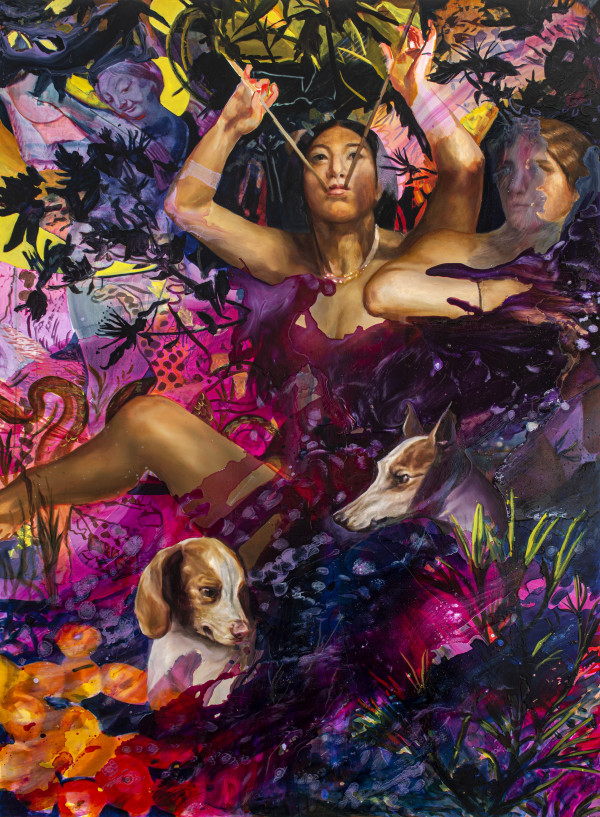Collection: The Raving Ones
Sean Horton (Presents) is pleased to announce a special project by American painter Angela Fraleigh for the VIP Lounge of Untitled Art, Miami Beach 2022. The Raving Ones is a 28 foot painting installation presenting three major (78 x 57 inch) paintings on hand-drawn wallpaper made especially for the fair.
Artist Angela Fraleigh has spent her career exploring narrative art’s hierarchical patterns. Keenly observing how images and roles from Western art history intersect with contemporary representation and attitudes, Fraleigh uncovers why certain tropes remain relevant, who they benefit, and how. Over the last decade, she has worked with institutions to create several site-specific solo exhibitions that reveal alternative accounts in their permanent collections. In rearranging the images of the past, the artist transforms how we see ourselves in the present.
In this new series Fraleigh draws parallels between art production and spellcraft, harnessing the magic of making the invisible, visible. Ecstatic Maenads gather amongst a frenzied tangle of medicinal herbs and serpents to raucously summon the powers of mythical female figures such as: Artemis, Hecate and Medusa to aid in casting a spell.
The maenad serves as a symbolic abandonment of the confining roles and identities of femininity and as an embrace of the pleasure seeking erratic, rebellious, unconcerned-with-popular-opinion kind of figure. In ancient sources, their transcendence gives them unparalleled strength and courage as well as a disregard for earthly consequences. Followers of Dionysus, referred to as the “The Raving Ones”, were feared because of their wildness, and they became a considerable source of fright for those who would seek to contain them.
Each painting serves as a kind of spell — one that disrupts, re-imagines, and re-signifies the female characters from familiar tales so as to challenge our perceptions of the past and experience a different future.
The links between the “witch” and systemic power structures such as capitalism, organized religion, and the patriarchy are profound and painfully relevant today as it relates to female power, bodily autonomy, and persecution. In her ground-breaking book Caliban and the Witch, Silvia Federici makes the important claim that the medieval witch-hunt across Europe was a necessary precondition for the emergence of flourishing capitalism. Women’s speech, movement, and social relationships were tightly controlled with the help of witch hunts and accusations of witchcraft on poor, peasant women, were in part an effort to dispossess them of the land they lived on. The witch-hunt was about controlling women’s bodies to repopulate a workforce for the wealthy.
In this moment of violent, institutional attack on bodily autonomy, the maenad responds with wild, joyful, reckless love and fierce, frenzied, protective anger–summoning the power to upend damaging societal structures.
Powered by Artwork Archive

